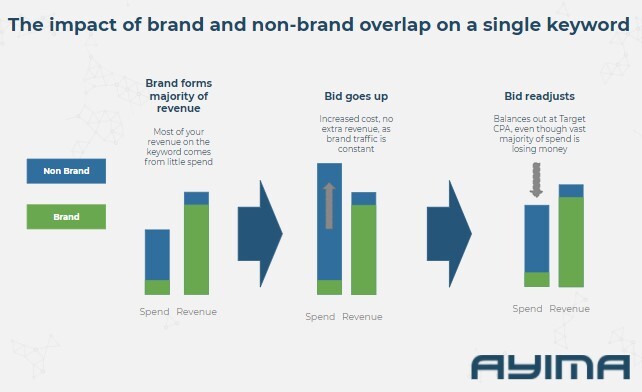How to conduct a PPC audit
Pay Per Click (PPC) audits are powerful. They can improve the efficiency of your Google Ads spends, so long as they are run effectively.
My past audits of Google Ads have found some major areas to improve, with impacts running into the millions. And that’s on some very household names.
Frequency depends on your available time and media spend. But you should be looking to audit each account at least once a year.
We’ll share some of the key areas you should audit, a few methods for looking at them, and why they are so important to performance.
If you’re trying to look more in-depth, we have a piece on more advanced audit techniques just for you. You can also find some of the most frequent mistakes we find in paid media audits here.
PPC account audit checklist
Your PPC account audit checklist should include:
- Account structure
- Keywords
- Ad and landing page copy
- Bidding
- Tracking
How to do a PPC audit
There are some key general best practices to PPC auditing:
- Pick how far back you want to review. Assess performance since the last audit, or following major changes to the site
- Get fresh eyes on the account. Try to give the audit to a team member or even a whole team not responsible for the day-to-day running of the ads. E.g. we often audit each other’s clients to ensure fresh insights
- Focus on the areas most likely to get you extra results
- Split out different segments. For example, audit your shopping and text campaigns separately.
1. Account structure
Check the structure of your campaigns, ad groups and negative keywords. The key aim of this should be to get rid of keyword overlap.
Keyword overlap is when a single search term could go to several different keywords, ad groups and even campaigns
This has a massive negative impact on performance. Overlap essentially means search terms bounce around your account. It impacts your bidding, reporting and strategy.
In your audit, check that brand search terms are actually going brand campaigns. And non-brand to non-brand campaigns.
You can see the impact of when you fail to do so below.
A good PPC audit will check to ensure that there is as little of this overlap as possible. Our advanced guide goes into some more complex ways of checking this.
2. Keywords
At this stage, check that you’re covering all the most relevant keywords to your mission. All of the search terms you are picking up should be both relevant and profitable.
At the most basic level, review:
- If there are any keyword duplicates
- That all match types are correct
- That keywords are contained within the most specific ad groups.
Filters in Google Ads Editor are a great tool for this. Below we show a way to test for broad match keywords without a broad match modifier.
The image below shows how to check that no keywords are in the wrong campaign.
NGrams also come in handy at this stage.
3. Ad and landing page copy
At this stage you should be checking ad copy for:
- Typos and spelling mistakes (e.g. American and British English)
- Make sure that you have enough copy variants
- That ad copy on both the landing page and search ads are relevant to the specific ad groups.
You should also make sure that the ad copy is relevant to specific keywords.
If your copy is poorly matched to keywords, this will produce poor scores. You can see this on your “Ad relevance” and “Landing page experience”.
These are both major factors of your Quality Score, so they could mean that you’re paying more for your clicks than you should be.
For example, in the below ads, every PPC ad is leading to a BMW-specific landing page, and using BMW in the copy. If you were serving a generic “used cars” ad to these searchers, you’re unlikely to be doing as well as you could be on these searches.
4. Bidding
This stage of the audit is all about making sure your bids are being made efficiently.
Slice and dice your data to view how performance differs across areas. Look at the device, time of day, day of the week, and location to spot any outliers.
If bid strategies have poor performance you may have to restructure the bidding portfolios. This gives their machine learning algorithms better data to run from.
At a more advanced level, check your bidding against audiences and demographics. For example, users who have visited your site before.
The search phrase is just one aspect of the broader context behind that search. Check to make sure you’re bidding on them based on where they are in the funnel.
5. Tracking
Finally, make sure that your tracking is all running as planned.
Are conversion tags firing correctly? Are the conversions you are tracking are actually relevant and useful?
Track the actions that represent value-adds for your business, and assign monetary values to those wherever possible. This could be direct sales, or newsletter subscriptions, or new account creations. And make sure these match what you’re seeing in your own figures.
Solid tracking is vital to bid strategies performing well. It goes back to the saying – dirty data in, dirty data out. If there is a flawed view of performance, smart bidding performance will be flawed.
The below image shows what an incorrect tracking setup looks like.
Building your own PPC audit template
Every account and every audit is different. There is no one-size-fits-all example of a perfect PPC audit. Every business has different needs and priorities. We rank 53 separate factors in standard audits, yet even these sometimes need adding to or ignored if the account demands.
This method of ranking lets us build an objective performance score, and identify the areas of greatest improvement.
The above example table gives you an idea of some areas you should be diving into to supercharge performance. From here you can pull together your own PPC audit template.
A good template will be adaptable. For example, having solid tracking will be critical for an ecommerce account, but it isn’t quite as important if you’re mainly running YouTube brand awareness activity.
Good PPC audits come from combining powerful insights with expertise. You can weaponise those insights and turn an account around.
Discover advanced tips and tricks, more details on our auditor tool, as well as visualisations here.
Interested in learning more, or running a PPC audit on your own campaigns? Our experts are on hand if you’d like a more in-depth personal analysis or a bespoke strategy. Get in touch with the team, we always love to talk PPC.



